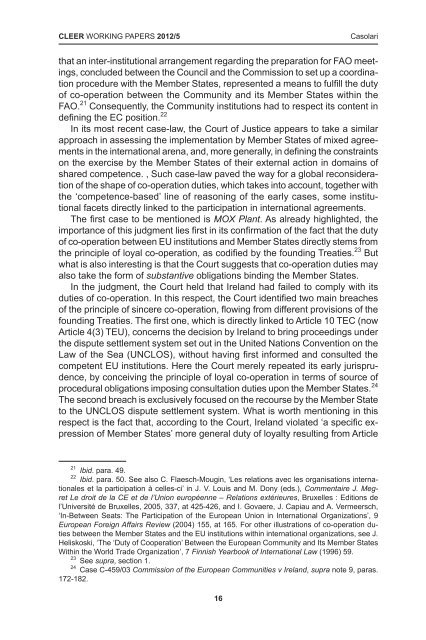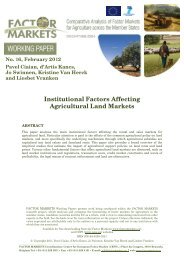CLEER WORKING PAPERS 2012/5Casolarithat an inter-institutional arrangement regarding the preparation for FAO meetings,concluded between the Council <strong>and</strong> the Commission to set up a coordinationprocedure with the Member States, represented a means to fulfill the duty<strong>of</strong> co-operation between the Community <strong>and</strong> its Member States within theFAO. 21 Consequently, the Community institutions had to respect its content indefining the EC position. 22In its most recent case-law, the Court <strong>of</strong> Justice appears to take a similarapproach in assessing the implementation by Member States <strong>of</strong> mixed agreementsin the international arena, <strong>and</strong>, more generally, in defining the constraintson the exercise by the Member States <strong>of</strong> their <strong>external</strong> action in domains <strong>of</strong>shared competence. , Such case-law paved the way for a global reconsideration<strong>of</strong> the shape <strong>of</strong> co-operation duties, which takes into account, together withthe ‘competence-based’ line <strong>of</strong> reasoning <strong>of</strong> the early cases, some institutionalfacets directly linked to the participation in international agreements.The first case to be mentioned is MOX Plant. As already highlighted, theimportance <strong>of</strong> this judgment lies first in its confirmation <strong>of</strong> the fact that the duty<strong>of</strong> co-operation between <strong>EU</strong> institutions <strong>and</strong> Member States directly stems fromthe principle <strong>of</strong> loyal co-operation, as codified by the founding Treaties. 23 Butwhat is also interesting is that the Court suggests that co-operation duties mayalso take the form <strong>of</strong> substantive obligations binding the Member States.In the judgment, the Court held that Irel<strong>and</strong> had failed to comply with itsduties <strong>of</strong> co-operation. In this respect, the Court identified two main breaches<strong>of</strong> the principle <strong>of</strong> sincere co-operation, flowing from different provisions <strong>of</strong> thefounding Treaties. The first one, which is directly linked to Article 10 TEC (nowArticle 4(3) T<strong>EU</strong>), concerns the decision by Irel<strong>and</strong> to bring proceedings underthe dispute settlement system set out in the United Nations Convention on theLaw <strong>of</strong> the Sea (UNCLOS), without having first informed <strong>and</strong> consulted thecompetent <strong>EU</strong> institutions. Here the Court merely repeated its early jurisprudence,by conceiving the principle <strong>of</strong> loyal co-operation in terms <strong>of</strong> source <strong>of</strong>procedural obligations imposing consultation duties upon the Member States. 24The second breach is exclusively focused on the recourse by the Member Stateto the UNCLOS dispute settlement system. What is worth mentioning in thisrespect is the fact that, according to the Court, Irel<strong>and</strong> violated ‘a specific expression<strong>of</strong> Member States’ more general duty <strong>of</strong> loyalty resulting from Article21 Ibid. para. 49.22 Ibid. para. 50. See also C. Flaesch-Mougin, ‘Les relations avec les organisations internationaleset la participation à celles-ci’ in J. V. Louis <strong>and</strong> M. Dony (eds.), Commentaire J. MegretLe droit de la CE et de l’Union européenne – Relations extérieures, Bruxelles : Editions del’Université de Bruxelles, 2005, 337, at 425-426, <strong>and</strong> I. Govaere, J. Capiau <strong>and</strong> A. Vermeersch,‘In-Between Seats: The Participation <strong>of</strong> the European Union in International Organizations’, 9European Foreign Affairs Review (2004) 155, at 165. For other illustrations <strong>of</strong> co-operation dutiesbetween the Member States <strong>and</strong> the <strong>EU</strong> institutions within international organizations, see J.Heliskoski, ‘The ‘Duty <strong>of</strong> Cooperation’ Between the European Community <strong>and</strong> Its Member StatesWithin the World Trade Organization’, 7 Finnish Yearbook <strong>of</strong> International Law (1996) 59.23 See supra, section 1.24 Case C-459/03 Commission <strong>of</strong> the European Communities v Irel<strong>and</strong>, supra note 9, paras.172-182.16
The principle <strong>of</strong> loyal co-operation: A ‘master key’ for <strong>EU</strong> <strong>external</strong> <strong>representation</strong>?10 EC’. 25 Such a special rule is contained in Article 377 TF<strong>EU</strong> (former Article292 TEC), which stipulates that Member States undertake not to submit adispute concerning the interpretation or application <strong>of</strong> the Treaties to any method<strong>of</strong> settlement other than those provided for therein. According to the Court,thus, the duty <strong>of</strong> loyal co-operation may also take the form <strong>of</strong> a substantiveobligation <strong>of</strong> result, which Member States have to respect when acting in theinternational arena. 26The judgment is useful, <strong>and</strong> goes some way towards clarifying the extent <strong>of</strong>the co-operation duties in the international arena. However, the Court does notsatisfactorily answer the question <strong>of</strong> what the role <strong>of</strong> the loyalty principle in the<strong>EU</strong> <strong>external</strong> <strong>representation</strong> could be. It makes, rather, reference to its applicationwith regard to the interplay between international tribunals in light <strong>of</strong> theprocess <strong>of</strong> fragmentation <strong>of</strong> international law. In particular, such process isconsidered by the Luxembourg judges from a European perspective with aview to ensuring the authority <strong>of</strong> the Court’s jurisdiction. 27 Viewed from thisangle, <strong>and</strong> despite the evolution <strong>of</strong> the legal discourse on the co-operationduties marked by the MOX ruling, this Eurocentric approach echoes the line <strong>of</strong>reasoning expressed by the Court in its early cases concerning the implementation<strong>of</strong> mixed agreements, <strong>and</strong> shows thus the existence <strong>of</strong> a red threadrunning throughout the case-law devoted to mixity.Issues concerning the relationship between the <strong>EU</strong>’s <strong>external</strong> <strong>representation</strong><strong>and</strong> Member States’ co-operation duties have directly been faced by the Courtin two infringement procedures against Luxembourg <strong>and</strong> Germany decided in2005 (the so-called Inl<strong>and</strong> Waterways cases). 28 In these judgments the Courtconcluded that, when there is ‘a concerted Community action at internationallevel’ (in casu, the adoption <strong>of</strong> a decision authorising the Commission to negotiatea multilateral agreement on behalf <strong>of</strong> the Community in the field <strong>of</strong> transport<strong>of</strong> passengers <strong>and</strong> goods by inl<strong>and</strong> waterway), the principle <strong>of</strong> loyalty‘requires, for that purpose, if not a duty <strong>of</strong> abstention on the part <strong>of</strong> the MemberStates, at the very least a duty <strong>of</strong> close cooperation between the latter <strong>and</strong> theCommunity institutions’. 29 In this respect, the Court held that the two MemberStates were in breach <strong>of</strong> their obligations under Article 4(3) T<strong>EU</strong> on the groundthat, after the <strong>EU</strong> institutions had decided to negotiate a multilateral agreement,25 Ibid. para. 171.26 For an example <strong>of</strong> judgment enunciating loyalty obligations <strong>of</strong> result at internal level,see Case C-265/95 Commission <strong>of</strong> the European Communities v French Republic [1997] ECRI-06959.27 See in this respect, F. Casolari, ‘Considérations «intersystémiques» en marge de l’affairede l’Usine MOX’ in H. Ruiz Fabri <strong>and</strong> L. Gradoni (eds.) ‘La circulation des concepts juridiques: ledroit international de l’environnement entre mondialisation et fragmentation’, Société de législationcomparée, Paris, 2009, 305, <strong>and</strong>, more generally, M. Parish, ‘International Courts <strong>and</strong> theEuropean Legal Order’, 23 European Journal <strong>of</strong> International Law (2012) 141.28 Case C-266/03 Commission <strong>of</strong> the European Communities v Gr<strong>and</strong> Duchy <strong>of</strong> Luxembourg[2005] ECR I-04805, <strong>and</strong> Case C-433/03 Commission <strong>of</strong> the European Communities v FederalRepublic <strong>of</strong> Germany [2005] ECR I-06985.29 Case C-266/03 Commission <strong>of</strong> the European Communities v Gr<strong>and</strong> Duchy <strong>of</strong> Luxembourg,supra note 28, para. 60, <strong>and</strong> Case C-433/03 Commission <strong>of</strong> the European Communities v FederalRepublic <strong>of</strong> Germany, supra note 28, para. 66.17CLEER WORKING PAPERS 2012/5
- Page 1: Founded in 2008, the Centre for the
- Page 4 and 5: CLEER WORKING PAPERS 2012/5Gosalbo
- Page 6 and 7: CLEER WORKING PAPERS 2012/5Gosalbo
- Page 8 and 9: CLEER WORKING PAPERS 2012/5Gosalbo
- Page 10 and 11: CLEER WORKING PAPERS 2012/5Blockman
- Page 12 and 13: CLEER WORKING PAPERS 2012/5Blockman
- Page 14 and 15: CLEER WORKING PAPERS 2012/5Casolari
- Page 16 and 17: CLEER WORKING PAPERS 2012/5Casolari
- Page 20 and 21: CLEER WORKING PAPERS 2012/5Casolari
- Page 22 and 23: CLEER WORKING PAPERS 2012/5Casolari
- Page 24 and 25: CLEER WORKING PAPERS 2012/5Casolari
- Page 26 and 27: CLEER WORKING PAPERS 2012/5Casolari
- Page 28 and 29: CLEER WORKING PAPERS 2012/5Casolari
- Page 30 and 31: CLEER WORKING PAPERS 2012/5Casolari
- Page 32 and 33: CLEER WORKING PAPERS 2012/5Casolari
- Page 34 and 35: CLEER WORKING PAPERS 2012/5Casolari
- Page 36 and 37: CLEER WORKING PAPERS 2012/5Casolari
- Page 38 and 39: CLEER WORKING PAPERS 2012/5Casolari
- Page 40 and 41: CLEER WORKING PAPERS 2012/5Van Elsu
- Page 42 and 43: CLEER WORKING PAPERS 2012/5Van Elsu
- Page 44 and 45: CLEER WORKING PAPERS 2012/5Van Elsu
- Page 46 and 47: CLEER WORKING PAPERS 2012/5Van Elsu
- Page 48 and 49: CLEER WORKING PAPERS 2012/5Van Elsu
- Page 50 and 51: CLEER WORKING PAPERS 2012/5Van Elsu
- Page 52 and 53: CLEER WORKING PAPERS 2012/5Van Elsu
- Page 54 and 55: CLEER WORKING PAPERS 2012/5Van Elsu
- Page 56 and 57: CLEER WORKING PAPERS 2012/5Van Elsu
- Page 58 and 59: CLEER WORKING PAPERS 2012/5Van Elsu
- Page 60 and 61: CLEER WORKING PAPERS 2012/5Van Elsu
- Page 62 and 63: CLEER WORKING PAPERS 2012/5Van Voor
- Page 64 and 65: CLEER WORKING PAPERS 2012/5Van Voor
- Page 66 and 67: CLEER WORKING PAPERS 2012/5Van Voor
- Page 68 and 69:
CLEER WORKING PAPERS 2012/5Van Voor
- Page 70 and 71:
CLEER WORKING PAPERS 2012/5Van Voor
- Page 72 and 73:
CLEER WORKING PAPERS 2012/5Van Voor
- Page 74 and 75:
CLEER WORKING PAPERS 2012/5Van Voor
- Page 76 and 77:
CLEER WORKING PAPERS 2012/5Van Voor
- Page 78 and 79:
CLEER WORKING PAPERS 2012/5Van Voor
- Page 80 and 81:
CLEER WORKING PAPERS 2012/5Van Voor
- Page 82 and 83:
CLEER WORKING PAPERS 2012/5Van Voor
- Page 84 and 85:
CLEER WORKING PAPERS 2012/5Van Voor
- Page 86 and 87:
CLEER WORKING PAPERS 2012/5McArdle
- Page 88 and 89:
CLEER WORKING PAPERS 2012/5McArdle
- Page 90 and 91:
CLEER WORKING PAPERS 2012/5McArdle
- Page 92 and 93:
CLEER WORKING PAPERS 2012/5McArdle
- Page 94 and 95:
CLEER WORKING PAPERS 2012/5McArdle
- Page 96 and 97:
CLEER WORKING PAPERS 2012/5McArdle
- Page 98 and 99:
CLEER WORKING PAPERS 2012/5McArdle
- Page 100 and 101:
CLEER WORKING PAPERS 2012/5McArdle
- Page 102 and 103:
CLEER WORKING PAPERS 2012/5McArdle
- Page 104 and 105:
CLEER WORKING PAPERS 2012/5McArdle
- Page 106 and 107:
CLEER WORKING PAPERS 2012/5Eckeswit
- Page 108 and 109:
CLEER WORKING PAPERS 2012/5Eckesdro
- Page 110 and 111:
CLEER WORKING PAPERS 2012/5Eckesto
- Page 112 and 113:
CLEER WORKING PAPERS 2012/5Eckesare
- Page 114 and 115:
CLEER WORKING PAPERS 2012/5EckesEU
- Page 116 and 117:
CLEER WORKING PAPERS 2012/5Eckeswil
- Page 118 and 119:
CLEER WORKING PAPERS 2012/5EckesPar
- Page 120 and 121:
CLEER WORKING PAPERS 2012/5Eckesthe
- Page 122 and 123:
CLEER WORKING PAPERS 2012/5Eckesise
- Page 124 and 125:
CLEER WORKING PAPERS 2012/5Eckesand
- Page 126 and 127:
CLEER WORKING PAPERS 2012/5Eckesto
- Page 128 and 129:
CLEER WORKING PAPERS 2012/5Eckesarg
- Page 130 and 131:
CLEER WORKING PAPERS 2012/5Wouters,
- Page 132 and 133:
CLEER WORKING PAPERS 2012/5Wouters,
- Page 134 and 135:
CLEER WORKING PAPERS 2012/5Wouters,
- Page 136 and 137:
CLEER WORKING PAPERS 2012/5Wouters,
- Page 138 and 139:
CLEER WORKING PAPERS 2012/5Wouters,
- Page 140 and 141:
CLEER WORKING PAPERS 2012/5Wouters,
- Page 142 and 143:
CLEER WORKING PAPERS 2012/5Wouters,
- Page 144 and 145:
CLEER WORKING PAPERS 2012/5Wouters,
- Page 146:
CLEER WORKING PAPERS 2012/5Wouters,








